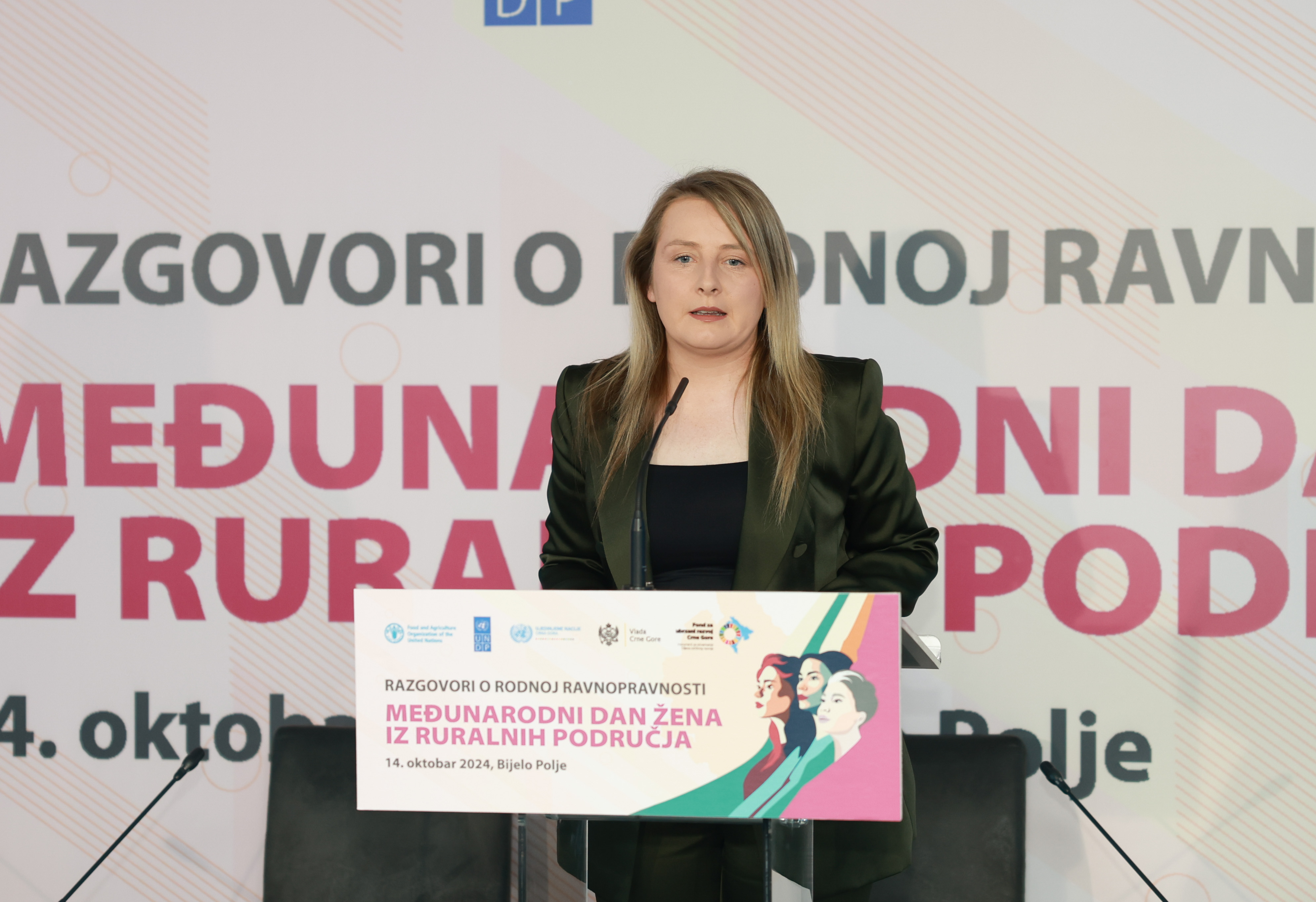Empowering rural women is key to sustainable development of Montenegro
October 14, 2024

Bijelo Polje, October 14, 2024 – Women in rural areas of Montenegro face numerous challenges, highlighting the need for systemic changes that will enable them to have equal access to resources, decision-making, and economic opportunities. This is a prerequisite for the sustainable development of rural areas, Montenegrin agriculture, and the economy.
This message was conveyed in Bijelo Polje at an event organized by the United Nations Development Programme (UNDP) in Montenegro and the United Nations Food and Agriculture Organization (FAO), with support from the Montenegro Acceleration Fund (MAF) and in partnership with the Ministry of Agriculture, Forestry and Water Management and the municipalities of Bijelo Polje, Plav, and Berane. The event marked the International Day of Rural Women.
Research developed since 2020 by UNDP, the Ministry of Agriculture, Forestry and Water Management, OSCE, and De Facto, as well as data from the publication “Invisible Women”, and recent Country Gender Assessment (CGA), further shed light on the depth of the problems faced by women in rural areas of Montenegro.
Only 16% of women are farm holders, and 32% are owners or co-owners of agricultural land. In the national register of farmers, men make up over 70% of insured individuals. Most women in rural areas inherit nothing from their families. Statistics show that women in northern Montenegro are seven times less likely to find employment compared to women in the south, and more than half of unemployed women never even attempt to enter the workforce. Women predominantly perform unpaid domestic work, spending an average of ten years of their lives on these activities.

UNDP Resident Representative in Montenegro, Ekaterina Paniklova, emphasized that the challenges faced by rural women are not only of an economic nature.
“The socio-economic gap between the northern region and the rest of Montenegro is widening, disproportionately affecting women in rural areas. They represent the segment of the population most vulnerable to poverty and exclusion, despite their significant contribution to agricultural production and community development. UNDP aims to address this gap by empowering women not only as workers but also as leaders in their communities. We believe that activities under the joint project with FAO and the significant support of the Montenegro Acceleration Fund (MAF) will contribute to improving the standard of living for rural women and enhancing the economic resilience of Montenegro in general. By focusing on the municipalities of Berane, Bijelo Polje, and Plav, we ensure that no one is left behind on Montenegro’s path to sustainable and inclusive development”, she said.

Krsto Rađenović, State Secretary of the Ministry of Agriculture, Forestry, and Water Management, stated that the development of rural areas is the foundation of economic and social unity for any country.
“Therefore, investing in agriculture and rural development in Montenegro is the cornerstone for preserving rural families, landscapes, traditions, and national character. Today’s agricultural policy supports the sustainability of rural areas while also preserving natural and cultural heritage. Women farmers play a major role in this, but due to the patriarchal legacy, they still face inequality compared to male farmers”, he said.

“On the occasion of the Rural Women’s Day it would be important to acknowledge a critical role played by women in sustaining rural economies, addressing climate risks, and conserving agrobiodiversity. Montenegro has shown a strong commitment to gender equality and women’s empowerment, particularly in policies, with mechanisms in place for gender analysis throughout state planning, decision-making processes, and various policy actions. FAO remains committed to creating an enabling environment for the development of women-led agrifood businesses and farms in the northern municipalities of Berane, Bijelo Polje, and Plav”, said Nabil Gangi, FAO Deputy Regional Representative for Europe and Central Asia.

“Empowering rural women is not just a moral obligation; it is key to the social and economic progress of our community. By investing in the entrepreneurial potential of women in rural areas, we are not only supporting individual advancement but also promoting sustainable development that benefits the entire community. Together, we are building a future where women from rural areas can thrive, innovate, and lead”, emphasized Selma Omerović, President of the Municipal Assembly of Bijelo Polje.
The event in Bijelo Polje provided a platform for discussing concrete strategies to overcome systemic barriers in line with Montenegro’s commitments to the 2030 Agenda for Sustainable Development and the EU Gender Equality Action Plan.

 Locations
Locations













